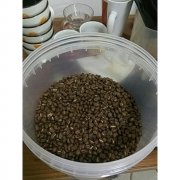Advantages and disadvantages of decaffeinated coffee beans decaf coffee affects healthy sleep is decaf coffee good?

Professional coffee knowledge exchange more coffee bean information please follow the coffee workshop (Wechat official account cafe_style)
The origin and development of decaf: why are all Swiss decaf sold?
Are you worried about palpitations, insomnia, or switching to decaffeinated coffee because of pregnancy?
Drinking coffee and wanting to consume less caffeine is actually related to the variety of coffee beans, grinding particle size, baking method, brewing method, water temperature, extraction time and so on. In addition, you can also choose specially treated decaffeinated coffee. Before roasting, coffee beans extract caffeine so that it contains less than 3% of the original caffeine. According to EU standards, decaffeinated coffee should contain no more than 0.1% of raw beans by weight.
Generally speaking, the side effects of coffee, such as palpitations and insomnia, are mostly caused by caffeine, so drinking decaffeinated coffee is indeed less likely to have palpitations and affect sleep. Some studies have also pointed out that for people who already have high blood sugar or diabetes, low caffeine may be the better choice, and it is less likely to counteract the function of coffee to stabilize blood sugar and aggravate diabetes by consuming too much coffee.
Decaffeine = remove side effects?
But Maria Bella, a dietitian and founder of extreme balanced Nutrition (Top Balance Nutrition), which specializes in weight control and healthy diet counseling in the United States, warns that you should not think that removing caffeine will remove all the side effects of coffee. There are still some health concerns that need to be confirmed by more research.
"many of the health concerns associated with coffee drinking, even if replaced with low caffeine, can still accumulate as a result of drinking too much, such as acid reflux and affecting mineral absorption such as iron, calcium and zinc, which in turn affects bone density," Bella said.
It is worth noting that the Harvard Medical School Family Health Guide (Harvard Medical School Family Health Guide) report even points out that decaffeinated coffee has a higher risk of raising cholesterol than regular coffee.
Although different studies have pointed out that caffeine has the effect of regulating blood lipids, caffeine and caffeinol in coffee are the key to increasing the concentration of triglycerides and cholesterol in the blood. In the past, some researchers suggested that as long as filter paper is used in general coffee, most of the coffee oils can be filtered out, effectively reducing the harm of drinking coffee to increase blood lipids. However, the Harvard report found that decaffeinated coffee, even after being filtered with filter paper, did not have much difference in oil content, which could still lead to an increase in blood lipids.
Researchers believe it may have something to do with caffeine extraction, but it has not been confirmed. New Scientist believes that it may have something to do with the variety of coffee beans; because Arabica beans (Arabica) have a higher unit price and are commonly found in boutique coffee, while low-caffeinated coffee beans are mostly Robusta beans, which contain more caffeine and white alcohol than the common Arabica beans.
Are caffeine extraction techniques suspected of causing cancer?
At present, there are mainly three kinds of caffeine extraction techniques, and solvent extraction is widely used, but it also causes the most discussion, because the residual amount of organic solvents is always worrying.
1 solvent extraction method
● dichloromethane extraction method | does not affect the flavor of coffee, but the solvent is a possible carcinogen
Raw coffee beans are treated with high-pressure steam, adjust the water content of coffee beans, and then soak in dichloromethane solvent, so that beans fully contact with the solvent to extract caffeine.
Su Nan-Wei, a professor in the Department of Agricultural Chemistry and Department of biochemical Technology at National Taiwan University, said that this kind of extraction is the most cost-effective method, because dichloromethane has the highest extraction efficiency for caffeine, is easy to volatilize, is not easy to remain, and has low reactivity with other substances.
However, dichloromethane is suspected to be a carcinogen and is harmful to the environment, and dichloromethane is currently banned from food processing in Taiwan; however, this practice is approved by the US Food and Drug Administration (FDA), setting only the allowable residue limit.
Su Nanwei mentioned that if you import decaffeinated coffee beans, it is still possible to buy coffee beans extracted with dichloromethane. But he further explained that the boiling point of dichloromethane is so low that it can be volatilized when heated to about 30 ∼ and 40 ℃, and it is not easy to remain; caffeinated coffee beans also go through the baking step at a temperature of about 160 ∼ 230 ℃, which can make dichloromethane completely volatile. Therefore, although the National Cancer Institute (National Cancer Institute) considers dichloromethane as a possible carcinogen, FDA still permits it, setting the upper limit of allowable residues for decaffeinated beans or instant coffee as a caffeine extraction solvent at 10ppm. While most decaffeinated beans are only about 1ppm, or even less, the risk of cancer is actually not high.
● ethyl acetate extraction method | safe and common, but slightly affect the flavor
Ethyl acetate is a new substitute due to consumers' misgivings about dichloromethane. Ethyl acetate exists in nature, and even the content of ethyl acetate in some fruits is higher than that of low-caffeinated coffee, which is considered to be a safer choice and a common practice at present.
The boiling point of ethyl acetate is slightly higher than that of dichloromethane, about 77 ℃, which is also easy to volatilize. The disadvantage is that ethyl acetate will affect the properties of coffee beans, and the flavor of roasted coffee beans is poor.
2 Swiss Water treatment method (Swiss Water) | safer but more expensive
No matter it is dichloromethane or ethyl acetate, there are doubts about residual organic solvents, so the "washing method" is developed. Making use of the water solubility of caffeine, soak the coffee beans in warm water, after caffeine and other ingredients are dissolved in the water, adsorb the caffeine in the extract with activated carbon, and then introduce the non-caffeinated extract back to the previous coffee beans. let the coffee beans reabsorb the lost ingredients, and then dehydrate and dry the coffee beans.
This approach emphasizes the use of no organic solvents to extract caffeine, making it a choice for healthy eaters. But the disadvantage is that even allowing coffee beans to reabsorb non-caffeinated extract will still affect the flavor of coffee beans; not only that, the low-caffeinated coffee produced by this method is also more expensive.
(3) Supercritical / liquid carbon dioxide high pressure extraction | expensive
There are a variety of decaffeinated procedures using high-pressure carbon dioxide, which can be used not only to remove caffeine from raw coffee beans, but also to remove caffeine from roasted coffee beans.
The main principle is that under the condition of specific high pressure and temperature, carbon dioxide has good penetration properties, and the flavor or specific components of coffee beans can be extracted according to demand. coupled with pressure, temperature control and the water content of carbon dioxide used for extraction, caffeine in coffee beans can be effectively separated.
In this way, there is no problem of solvent residue at all, and the original coffee flavor can be added back to the coffee bean by multi-stage extraction technology to retain the original flavor of coffee bean. But the problem is that because of the need for special equipment, the price is very expensive and not popular.
In fact, whether it is regular coffee or decaffeinated coffee, "moderate drinking" and "less cream and sugar" are still the biggest principles. However, if you have high cholesterol or belong to a group with a high risk of cardiovascular disease, it is best to discuss with your doctor and dietitian whether you are suitable for decaffeinated coffee
.
Important Notice :
前街咖啡 FrontStreet Coffee has moved to new addredd:
FrontStreet Coffee Address: 315,Donghua East Road,GuangZhou
Tel:020 38364473
- Prev

The effect of decaf on the body the difference between drinking decaf and regular coffee for a long time
Professional coffee knowledge exchange more coffee bean information please follow the origin and development of decaf coffee in coffee workshop (Wechat official account cafe_style): why are all Swiss water treatment decaf coffee sold? How much caffeine a cup of coffee contains depends not only on the variety of coffee beans, but also on coffee.
- Next

Is it healthier to drink decaf coffee? Pregnant women also need to be careful when drinking decaf coffee!
Professional coffee knowledge exchange more coffee bean information please follow the origin and development of decaf coffee in coffee workshop (Wechat official account cafe_style): why are all Swiss water treatment decaf coffee sold? Are you a coffee person? Doctors warn that drinking decaffeinated coffee will not make you healthier, but may increase the risk of heart disease; pregnant women drink
Related
- Beginners will see the "Coffee pull flower" guide!
- What is the difference between ice blog purified milk and ordinary milk coffee?
- Why is the Philippines the largest producer of crops in Liberia?
- For coffee extraction, should the fine powder be retained?
- How does extracted espresso fill pressed powder? How much strength does it take to press the powder?
- How to make jasmine cold extract coffee? Is the jasmine + latte good?
- Will this little toy really make the coffee taste better? How does Lily Drip affect coffee extraction?
- Will the action of slapping the filter cup also affect coffee extraction?
- What's the difference between powder-to-water ratio and powder-to-liquid ratio?
- What is the Ethiopian local species? What does it have to do with Heirloom native species?

